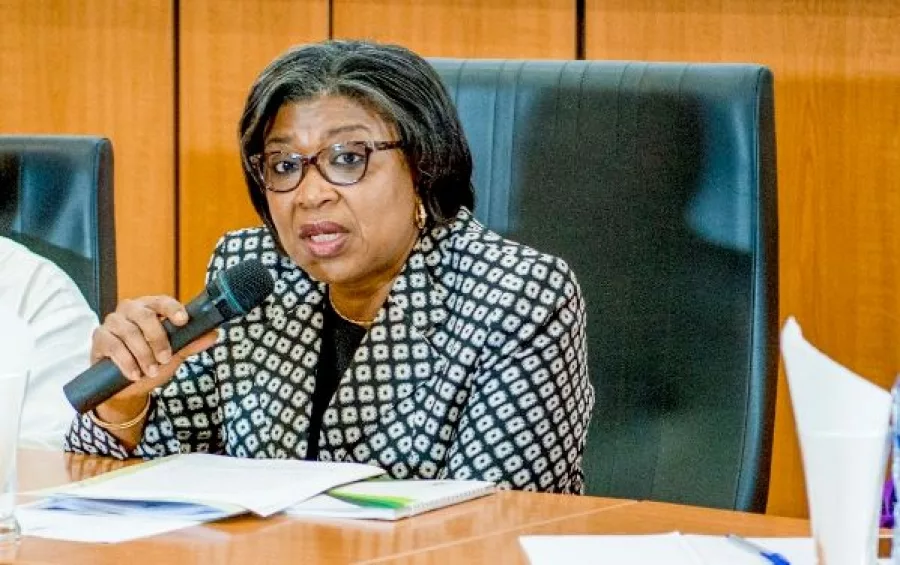The federal government is worried about the nation’s rising debt stock, which the director-general of Debt Management Office, Ms Patience Oniha, says would hit about N72 trillion with the new borrowing in the approved 2023 national budget.
Nigeria’s total debt stock stood at N44 trillion as of September 2022. The public debt is an aggregation of federal government, 36 state governments and the Federal Capital Territory debts.
“So, if you add the new borrowing, again, the budget is for the full year, it’s not like we are tying the new borrowing in the budget to be raised before the end of this administration. Certainly, some part of that could be done; give or take – depending on market conditions – N5 trillion. So, we are looking at about N72 trillion at about June; again, depending on market conditions,” Ms Oniha said yesterday.
The DMO DG said the figure may not record a significant increase when the debt data for the last quarter of 2022 is released because much of the borrowing was done in September.
“So, it won’t be significantly different,” Oniha said yesterday at the public presentation and breakdown of the highlights of the 2023 Appropriation Act in Abuja.
The expected increase in the total debt stock is a combination of the current debt stock, government loan to CBN, new borrowings in the 2023 budget, issuance of Promissory Notes and cost of debt service.
Oniha expressed worry over the huge fiscal deficit in the budget which she said can only be reduced by an improvement in revenue generation.
The N21.82 trillion 2023 budget has a deficit of N11.34 trillion for 2023. This represents 5.03 percent of GDP.
The executive had asked the National Assembly to approve securitization of the N22.7 trillion Central Bank of Nigeria’s Ways and Means to the federal government to lighten the burden of cost of debt service on the government.
Also, minister of finance, budget and national planning, Zainab Ahmed, said if the approval is given, it will bring a significant fiscal relief to the federal government in addition to significant cost savings in debt service that will be derived by securitizing it. Currently, the ways and means is running at MPR+3 which today is averaging about 18.5 percent, which is a very high cost.
However, if the approval is not given, the finance minister said, “We will end up with interest rate accruing again and adding to the ways and means – anything from N1.8 trillion to about N2.2 trillion. That will be the consequence.
“Once that approval is given, we will benefit from a lower interest cost of nine percent and we will benefit from a fresh negotiated plan that we have made of 40 years with a three-year moratorium. That will provide very significant fiscal relief to the federal government.”
Meanwhile, the finance minister has announced that the federal government has phased out pioneer status incentive for mature industries that have “illegally” benefited from the tax exemption programme.
She said the federal government is working on phasing out the “antiquated” pioneer status incentive and other tax exemptions for mature industries with the 2022 finance bill.
The finance minister said government has lost over N6 trillion to industries that are supposed to have exited the programme and allowed for infant industries to onboard, even though she acknowledged that it may be an unpopular move that is likely to draw public criticism.
She said infant industries would be included on the list of those to enjoy tax incentives to enhance their survival.
Speaking to the issue of N19 billion revenue projection from stamp duty in the new budget, Mrs Ahmed said the recent allegation of missing stamp duty funds by a federal lawmaker is currently being investigated by different committees both in the National Assembly and security agencies.
Ahmed said if the allegation proves to be true and funds are recovered, it would help government to finance its huge budget deficit.
A member of the House of Representatives, Muhammed Kazaure had raised the alarm of alleged theft of N89.1 trillion stamp duty proceeds, accusing governor of the Central Bank of Nigeria (CBN) of being behind the acclaimed missing money.
In his welcome remarks, director-general of the Budget Office of the Federation, Ben Akabueze, said the government has put right measures in place that now ensure that the national budget is not padded during the appropriation process.
An update of the 2022 budget performance showed that as of November 2022, FGN’s retained revenue was N6.50 trillion, 87 percent of the prorata target of N7.48 trillion.
On the other hand, the actual spending as of November 30 was N12.87 trillion. Of this amount, N5.24 trillion was for debt service; N3.94 trillion for personnel costs, including pensions.
Statutory Transfers, Overhead and Service Wide Votes expenditures totalled N1.81 trillion; and N1.88 billion was released for capital expenditure.
Presenting a breakdown of the 2023 budget yesterday, the minister said oil sector only contributed 22 percent to the economy in 2022, a development she said is an indication that “the economy is truly, truly diversified.” Ahmed said, adding that the non-oil sector, driven by communications and agriculture, had grown the economy significantly.
The finance minister said the early passage of the 2023 budget is critical to effective delivery of government’s legacy projects, achievement of macro-fiscal and sectoral objectives, smooth transition programme and effective take-off of the incoming administration.
“To achieve the objectives of the budget, we will intensify our revenue mobilisation efforts and intensify current efforts towards the realisation of our crude oil production and export targets,” she stated.
Exchange rate may go above $1/N1,000 – Utomi
A political economist, Prof Pat Utomi, has said the exchange rate of the naira to the dollar may go above $1 to N1,000 if some “dramatic” measures are not taken by the federal government fiscal and economic policies.
He also said the ways and means funding option of the federal government through the Central Bank of Nigeria (CBN) has become a routine violation of fiscal responsibility laws.
“If you continue to generate or create money without creating value, the consequence is inflation and exchange rate will be collapsing, and will just multiply,” Utomi said on Channels Television’s Politics Today programme yesterday.
Nigeria’s inflation rate as of the end of November 2022 was 21.47%. At the Investors and Exporters (I&E) window of the foreign exchange market, $1 exchanged for N450.03 as of January 4, 2023 while a single dollar goes for over N700 in the parallel market.
However, Utomi said unless some dramatic economic steps are taken, a single naira may exchange for over N1,000.
“I can tell you, God forbid, if we don’t do something dramatic, the effect of this budget is that the exchange rate will go past N1,000; that is the direct effect of this budget and you are going to see inflation probably go up to 50% if some new dramatic changes are not made,” he said, making reference to the 2023 Appropriation Bill totalling N21.83 trillion and signed into law by President Muhammadu Buhari on Tuesday.
Utomi, an ally of Labour Party (LP) 2023 presidential candidate, Peter Obi, said the 2023 “weak budget” will lead to loss of jobs, inflation, and unimaginable economic hardship.
He described the economic policies of the Buhari administration as “not people-friendly” and “not economic-growth oriented”.
He blamed leadership at the centre and dysfunctional state governors for Nigeria’s economic woes and insisted that one of the ways forward is for the federal government controlled by the All Progressives Congress (APC) to fix the civil service.





